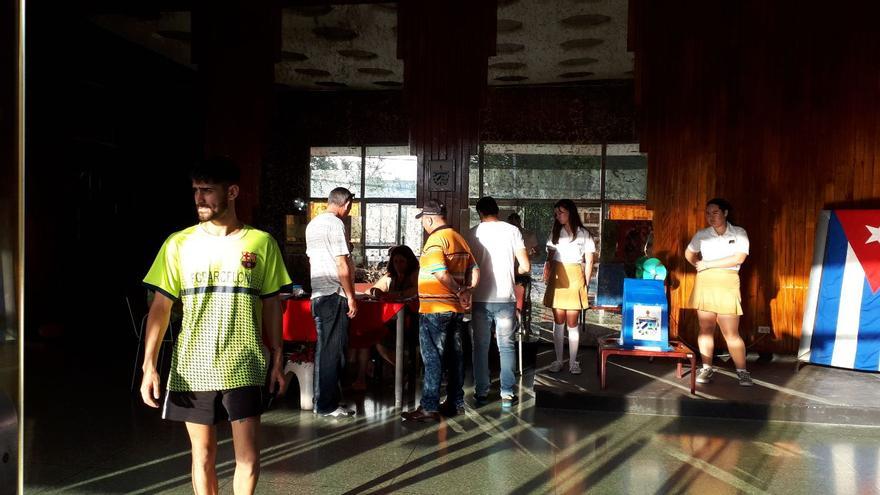
![]() 14ymedio, Reinaldo Escobar, Havana, February 26, 2019 — The preliminary results from the referendum on the new Constitution confirm what was expected: that the new Constitution was going to be approved by the majority and that the process was going to make clear the increase in citizen dissent by putting a number to that group that rejects the administration of the authorities.
14ymedio, Reinaldo Escobar, Havana, February 26, 2019 — The preliminary results from the referendum on the new Constitution confirm what was expected: that the new Constitution was going to be approved by the majority and that the process was going to make clear the increase in citizen dissent by putting a number to that group that rejects the administration of the authorities.
More than two and a half million voters all over the country have distanced themselves from the new Constitution, between No, null, and blank votes, in addition to abstentions. Many have thus found themselves on the path to distancing themselves from the ruling political and economic system on the island.
However, it is necessary to recognize that the government managed to get the Constitution ratified, it was enough with 51% of registered voters to declare that the new Constitution had been approved in the referendum. The preliminary numbers unveiled by the National Electoral Commission show that 73.31% of citizens with the right to vote marked the Yes square. To emphasize the victory, official media outlets mention that this number is 86.85% of the votes cast, that is to say taking out of the count those who abstained.
But this is not really a victory that a decent Government can feel proud of.
Across the length and breadth of the country the official campaign to persuade voters to vote Yes was so overwhelming that there was practically no space to look where the official slogans weren’t harping at voters.
Television interviewed hundreds of people of different levels of education, race, sex, and profession who reaffirmed with arguments or emotions, or even both, their indisputable motives to ratify the new Constitution.
Indisputable, yes, because none of the more than two and a half million Cubans who did not mark Yes on the ballot had the opportunity to explain their reasons. Much less the 706,400 Cubans who overcoming fears made their cross in the No box.
What would have happened if a week before February 24 there had been a public and televised debate between the conflicting arguments? On the list of those who could have defended the negative vote would have been people like Dagoberto Valdés, Manuel Cuesta, Rosa María Payá, Juan Moreno, Julio Aleaga, Miriam Celaya, Pedro Campos, José Daniel Ferrer, and Eliécer Ávila.
But they also could have given space to those who promoted abstention, and there voters would have heard Antonio González Rodiles, Claudio Fuentes, Ailer González, Ángel Moya, and many others.
They have wanted to make people believe that the propaganda for Yes was organized by the masses, not the Government. Voters have every right to know where the budget to pay for that campaign came from. In countries with a democratic tradition it usually happens that the person who has been elected president is asked for their resignation when it is discovered that they financed their campaign with shady funds.
But this “tied-up monkey against a hungry lion” was also muzzled. Almost all of the country’s opposition organizations have denounced the persecution the promoters of No were subjected to, as were, along with them, those who wanted to have an independent observation of the process.
Not only were those who differed from the official line denied a place in public spaces, but they were also prevented from gathering peacefully to come to agreement.
Assaults on several homes of Patriotic Union of Cuba (Unpacu) activists and arbitrary detentions against different bodies of independent observers were systematic, as well as verbal threats (never written) issued by State Security officials against political activists and independent journalists. “We are not going to allow it,” they repeated, caressing the butts of their pistols.
It is basic in any electoral process to recognize the results if the previously established regulations are fulfilled or, at least, there is not evidence that they have been violated.
Those who went to vote No or those who stayed at home in order to not play into what they considered a farce knew that these were the rules. With them, the Government managed to have the electorate ratify the new Constitution and that has to be recognized even though the authorities never recognize that they played dirty. There is no proof that they have committed fraud, but there is evidence that they played a trick.
Translated by: Sheilagh Carey
___________________
The 14ymedio team is committed to serious journalism that reflects the reality of deep Cuba. Thank you for joining us on this long road. We invite you to continue supporting us, but this time by becoming a member of 14ymedio. Together we can continue to transform journalism in Cuba.
